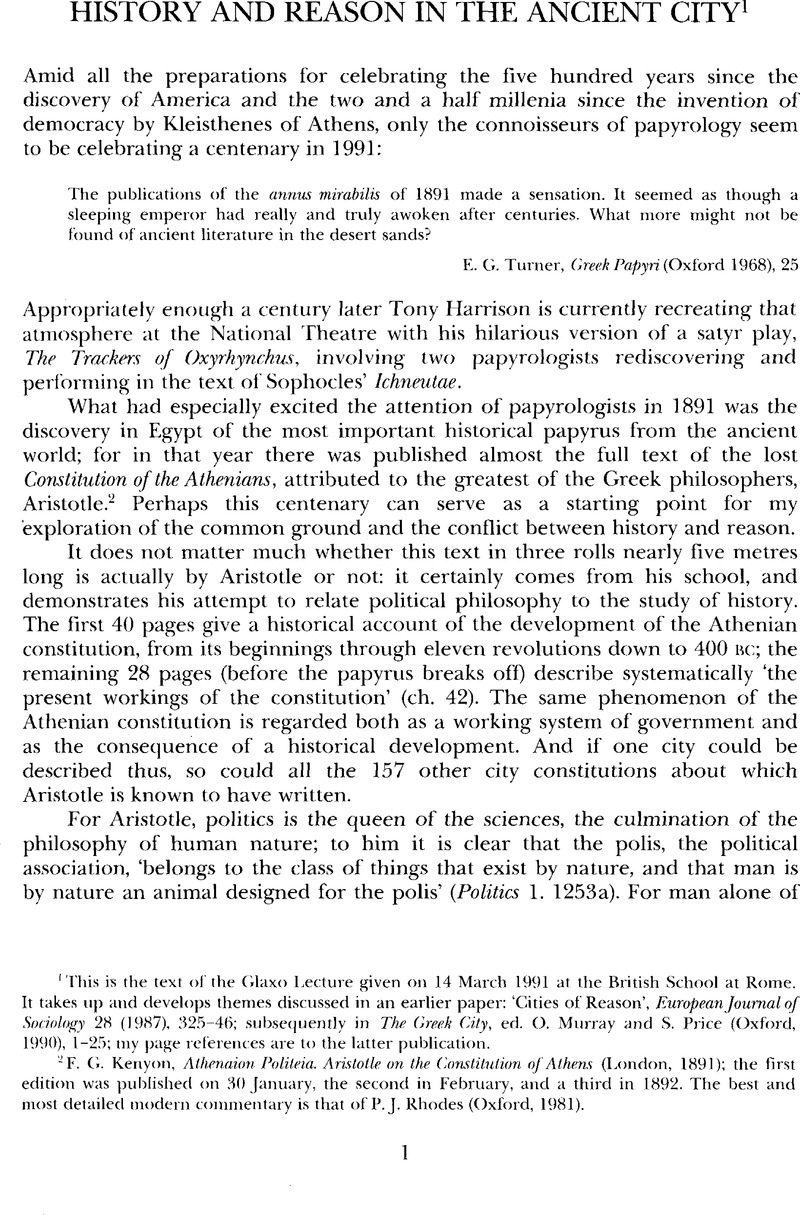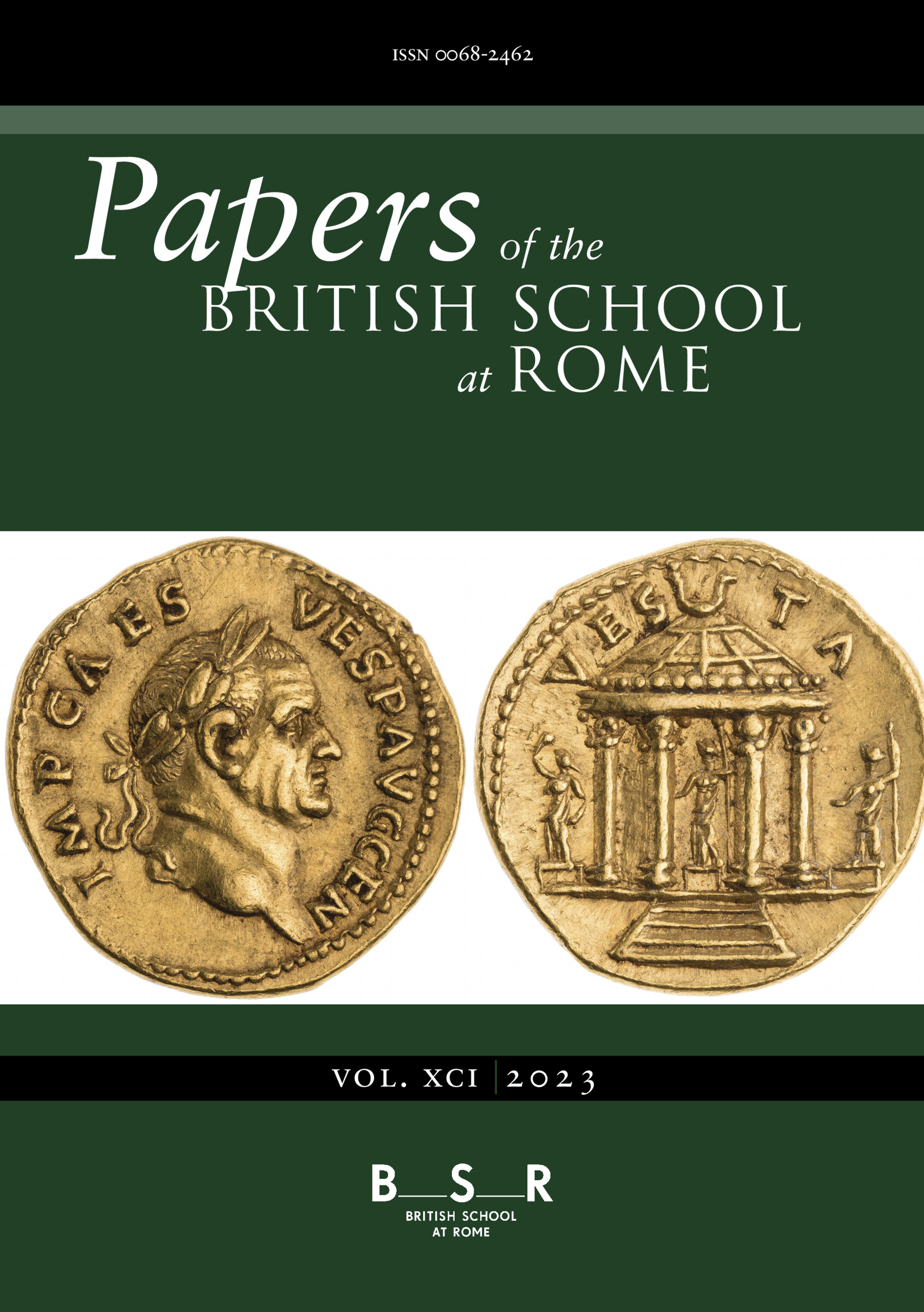Article contents
History and reason in the ancient city1
Published online by Cambridge University Press: 09 August 2013
Abstract

- Type
- Articles
- Information
- Copyright
- Copyright © British School at Rome 1991
Footnotes
This is the text of the Glaxo Lecture given on 14 March 1991 at the British School at Rome. It takes up and develops themes discussed in an earlier paper: ‘Cities of Reason’, European Journal of Sociology 28 (1987), 325–46; subsequently in The Greek City, ed. O. Murray and S. Price (Oxford, 1990), 1–25; my page references are to the latter publication.
References
2 Kenyon, F. G., Athenaion Politeia. Aristotle on the Constitution of Athens (London, 1891)Google Scholar; the first edition was published on 30 January, the second in February, and a third in 1892. The best and most detailed modern commentary is that of P.J. Rhodes (Oxford, 1981).
3 The logic of this moment in the history of the Tractarian Movement is best captured in the novel Loss and Gain, written by J. H. Newman just after his conversion to Catholicism (1848, reprinted Oxford, 1986).
4 ‘Cities of Reason’, o.c. n. 1.
5 See esp. Vernant, J.-P., Les origines de la pensée grecque (Paris, 1962)Google Scholar; Lloyd, G. E. R., The Revolutions of Wisdom (Berkeley, 1987)Google Scholar; Goldhill, S., Reading Greek Tragedy (Cambridge, 1986)CrossRefGoogle Scholar.
6 See ‘Cities of Reason’, 4–8.
7 Lloyd, G. E. R., Magic, Reason and Experience (Cambridge, 1979)Google Scholar.
8 Forrest, W. G., The Emergence of Greek Democracy (London, 1966)Google Scholar; cf. Ostwald, M., From Popular Sovereignly to the Sovereignty of Law (Berkeley, 1986)Google Scholar.
9 Jones, E., The Life and Work of Sigmund Freud ch. i. (abridged edition, Harmondsworth, 1964), 37–43Google Scholar.
10 ‘Herodotus and Hellenistic Historiography’, Classical Quarterly 22 (1972), 207–13Google Scholar.
11 Malinowski, B., Myth in Primitive Psychology (London, 1926)Google Scholar; cf. Kirk, G. S., Myth (Berkeley, 1970), 254–7Google Scholar; Tudor, H., Political Myth (London, 1972)CrossRefGoogle Scholar.
12 Cf. Jourdain-Annequin, C., Héraclès aux portes du soir (Besançon, 1989), part IIGoogle Scholar.
13 Hansen, M. H., ‘Solonian Democracy in fourth-century Athens’, Classica et Medievalia 40 (1989), 71–99Google Scholar.
14 Loraux, N., L'Invention d'Athènes (Paris, 1981)Google Scholar; Nouhaud, M., L'Utilisation de l'histoire par les orateurs altiques (Paris, 1982)Google Scholar; Thomas, R., Oral Tradition and Written Record in Classical Athens (Cambridge, 1989)CrossRefGoogle Scholar.
15 Habicht, C., ‘Falsche Urkunden zur Geschichte Athens im Zeitalter der Perserkriege’, Hermes 89 (1961), 1–35Google Scholar.
16 See my forthcoming article, ‘Lycurgus and the Death of Tragedy’.
17 Vernam, J.-P., Les Origines de la pensée grecque (Paris, 1962)Google Scholar.
18 Murray, O., Early Greece (London, 1980), ch. 6Google Scholar.
19 Andrewes, A., The Greek Tyrants (London, 1956)Google Scholar.
20 See ‘Cities of Reason’, 12–6.
21 Early Greece, ch. 10.
22 Cf. D'Agostino, B., ‘Military Organization and Social Structure in Archaic Etruria’, The Greek City (o.c. n. 1), ch. 3Google Scholar
23 Storia di Roma i (Turin, 1988)Google Scholar: ‘La nascita della cittàrsquo; (pp. 153–80), and ‘La città riformata’ (pp. 203–39); see also his recent article, ‘Il “paesaggio politico” della città arcaica in Grecia ed in Italia: per uno studio comparato del centro e delle tribù’, in Opus 6–8 (1987–1999), 71–85Google Scholar.
24 Aristotle F 609–10 Rose.
25 ‘It must be maintained, however, that the Early State concept appears to suit much better the Italian than the archaic Greek political evolution. This applies to its earliest history and social stratification as well as to its later growth and expansion’: van der Vliet, E.Ch.L., ‘Early Rome and the Early State’ in Eder, W., Staal und Staatlichkeil in der frühen römischen Republik (1990), 233–57, at p. 255Google Scholar.
- 8
- Cited by


